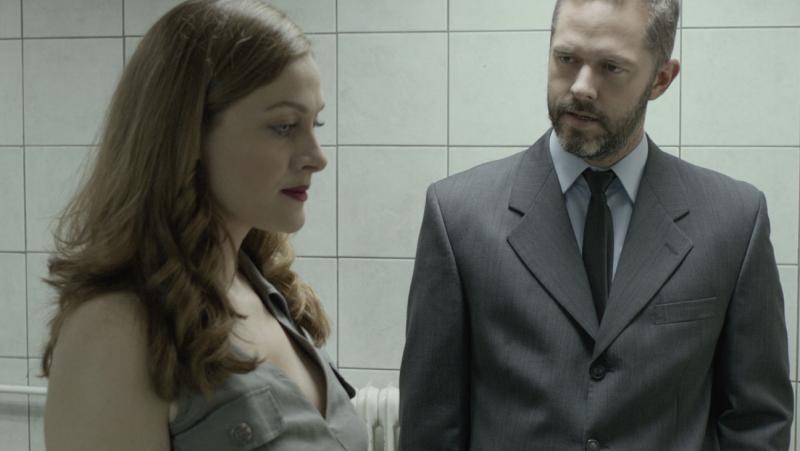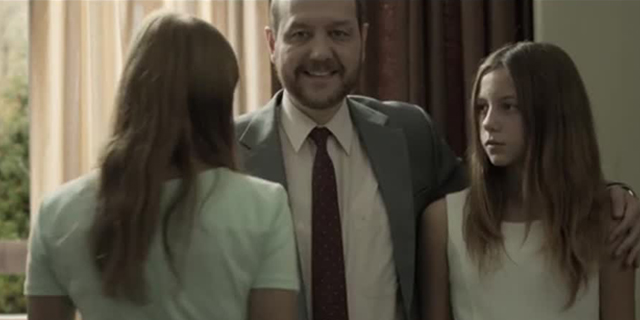Miss Violence | reviews, news & interviews
Miss Violence
Miss Violence
Greek tragedy on a domestic scale in this haunting effort from Alexandros Avranas

Miss Violence opens with an 11th birthday party whose brightly coloured balloons, pointed party hats and forced family jollity might seem unremarkable if a little girl hadn't chosen to stick Leonard Cohen's "Dance Me to the End of Love" on the stereo - not only Cohen at his most sinisterly sensual but a song inspired by the Holocaust.
After being coerced into a family photo and waltzing with her beaming grandpa, the birthday girl Angeliki (Chloe Bolota, pictured below right with Themis Panou) calmly removes herself from the festivities and heads to the balcony where she mounts the railing, looks down the lens and smiles - before quite deliberately ending her own life. This look to the camera (ie. us) is crucial: a connection which, though fleeting, nevertheless compels us to take up her cause - to unpick this cruellest of mysteries.
This audacious opening sequence announces the film's confrontational yet carefully controlled style. The opening credits appear over Angeliki's tiny broken body as people gather round; viewed in an aerial shot the arrangement takes on an eerie beauty, and it's as if she's looking down on herself from above. We're being asked not only why such a young girl has done this, but why there's a strange serenity to her death.
Avranas gets plenty of mileage out of the children's fearful faces
We get to know Angeliki's family in the aftermath of this life-shattering event with our suspicions already roused. What at first might appear to be people trying to manage their way through grief is bit by bit - in a series of what the director describes as "small explosions" - revealed as something significantly more disturbing. Alexandros Avranas' exacting directorial style is a perfect fit for the self-penned material - the stilted, precisely choreographed interactions, washed-out palette and (terrified) stillness of the performers point to a family living in fear.
The tyrant is gradually and chillingly revealed as the diminutive, apparently unassuming accountant grandfather (Themis Panou). His shut-in wife (Reni Pittaki) has long since taken to closing her eyes to what goes on around her, retreating to bed for long periods. Their eldest daughter, the adult Eleni (the wonderfully expressive Eleni Roussinou) - who is the mother of the dead child along with two younger children - seems drugged into submission, while her 14-year-old sister Myrto (Sissy Toumasi) is the lone voice of dissent.
 Miss Violence is the Greek writer-director's second feature. It follows the little seen Without - which despite nabbing multiple prizes at the Thessaloniki Film Festival in 2008 didn't even screen theatrically in Greece - and is itself an award-winner, most notably taking Best Director and Best Actor (for Panou) at the 2013 Venice Film Festival.
Miss Violence is the Greek writer-director's second feature. It follows the little seen Without - which despite nabbing multiple prizes at the Thessaloniki Film Festival in 2008 didn't even screen theatrically in Greece - and is itself an award-winner, most notably taking Best Director and Best Actor (for Panou) at the 2013 Venice Film Festival.
Although stylistically there's some crossover with some of the country's recent quirky outputs Miss Violence is less explicitly odd than, say, Dogtooth (with which it also shares subject matter) and Attenberg - and it certainly isn't funny. Avranas (who co-wrote the script with Kostas Peroulis) has stated that the film was inspired by the work of Pasolini, Haneke and Fassbinder, alongside the real suicide of an 11-year-old girl which happened while the director was living in Berlin, with the film his attempt at speculating as to why someone so young might feel compelled to do such a thing.
Avranas gets plenty of mileage out of the children's fearful faces, creating a twisted reality where every closed door is unpleasantly loaded. In its drip-fed misery and meticulously orchestrated discomfort Miss Violence paints a compelling picture of domestic terror. This is the horrifying, haunting story of the enemy within.
rating
Explore topics
Share this article
The future of Arts Journalism
You can stop theartsdesk.com closing!
We urgently need financing to survive. Our fundraising drive has thus far raised £49,000 but we need to reach £100,000 or we will be forced to close. Please contribute here: https://gofund.me/c3f6033d
And if you can forward this information to anyone who might assist, we’d be grateful.

Subscribe to theartsdesk.com
Thank you for continuing to read our work on theartsdesk.com. For unlimited access to every article in its entirety, including our archive of more than 15,000 pieces, we're asking for £5 per month or £40 per year. We feel it's a very good deal, and hope you do too.
To take a subscription now simply click here.
And if you're looking for that extra gift for a friend or family member, why not treat them to a theartsdesk.com gift subscription?
more Film
 The Mastermind review - another slim but nourishing slice of Americana from Kelly Reichardt
Josh O'Connor is perfect casting as a cocky middle-class American adrift in the 1970s
The Mastermind review - another slim but nourishing slice of Americana from Kelly Reichardt
Josh O'Connor is perfect casting as a cocky middle-class American adrift in the 1970s
 Springsteen: Deliver Me From Nowhere review - the story of the Boss who isn't boss of his own head
A brooding trip on the Bruce Springsteen highway of hard knocks
Springsteen: Deliver Me From Nowhere review - the story of the Boss who isn't boss of his own head
A brooding trip on the Bruce Springsteen highway of hard knocks
 The Perfect Neighbor, Netflix review - Florida found-footage documentary is a harrowing watch
Sundance winner chronicles a death that should have been prevented
The Perfect Neighbor, Netflix review - Florida found-footage documentary is a harrowing watch
Sundance winner chronicles a death that should have been prevented
 Blu-ray: Le Quai des Brumes
Love twinkles in the gloom of Marcel Carné’s fogbound French poetic realist classic
Blu-ray: Le Quai des Brumes
Love twinkles in the gloom of Marcel Carné’s fogbound French poetic realist classic
 Frankenstein review - the Prometheus of the charnel house
Guillermo del Toro is fitfully inspired, but often lost in long-held ambitions
Frankenstein review - the Prometheus of the charnel house
Guillermo del Toro is fitfully inspired, but often lost in long-held ambitions
 London Film Festival 2025 - a Korean masterclass in black comedy and a Camus classic effectively realised
New films from Park Chan-wook, Gianfranco Rosi, François Ozon, Ildikó Enyedi and more
London Film Festival 2025 - a Korean masterclass in black comedy and a Camus classic effectively realised
New films from Park Chan-wook, Gianfranco Rosi, François Ozon, Ildikó Enyedi and more
 After the Hunt review - muddled #MeToo provocation
Julia Roberts excels despite misfiring drama
After the Hunt review - muddled #MeToo provocation
Julia Roberts excels despite misfiring drama
 London Film Festival 2025 - Bradley Cooper channels John Bishop, the Boss goes to Nebraska, and a French pandemic
... not to mention Kristen Stewart's directing debut and a punchy prison drama
London Film Festival 2025 - Bradley Cooper channels John Bishop, the Boss goes to Nebraska, and a French pandemic
... not to mention Kristen Stewart's directing debut and a punchy prison drama
 Ballad of a Small Player review - Colin Farrell's all in as a gambler down on his luck
Conclave director Edward Berger swaps the Vatican for Asia's sin city
Ballad of a Small Player review - Colin Farrell's all in as a gambler down on his luck
Conclave director Edward Berger swaps the Vatican for Asia's sin city
 London Film Festival 2025 - from paranoia in Brazil and Iran, to light relief in New York and Tuscany
'Jay Kelly' disappoints, 'It Was Just an Accident' doesn't
London Film Festival 2025 - from paranoia in Brazil and Iran, to light relief in New York and Tuscany
'Jay Kelly' disappoints, 'It Was Just an Accident' doesn't
 Iron Ladies review - working-class heroines of the Miners' Strike
Documentary salutes the staunch women who fought Thatcher's pit closures
Iron Ladies review - working-class heroines of the Miners' Strike
Documentary salutes the staunch women who fought Thatcher's pit closures
 Blu-ray: The Man in the White Suit
Ealing Studios' prescient black comedy, as sharp as ever
Blu-ray: The Man in the White Suit
Ealing Studios' prescient black comedy, as sharp as ever

Add comment